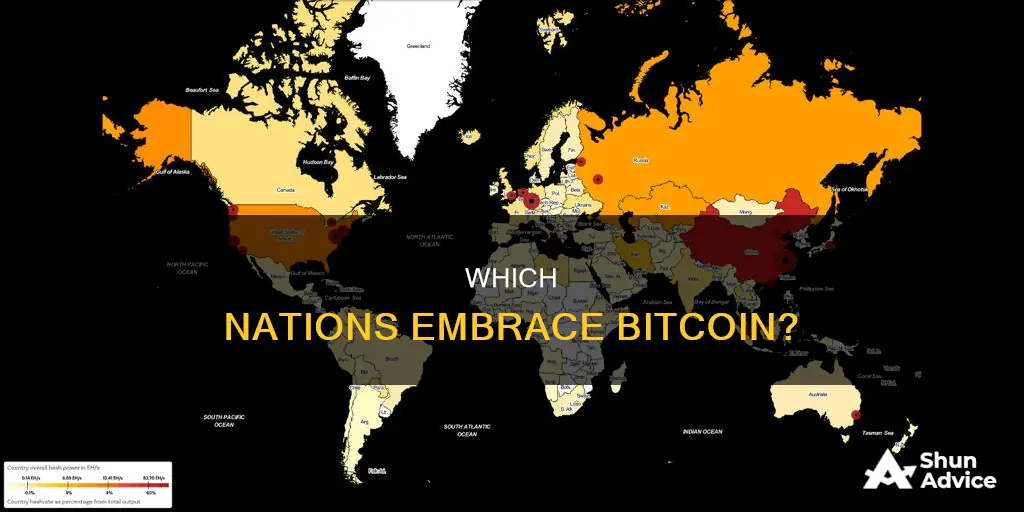
El Salvador became the first country to adopt Bitcoin as legal tender in 2021. Since then, the Central African Republic has followed suit, with its parliament voting unanimously to make Bitcoin legal tender in April 2022. However, the adoption of Bitcoin in El Salvador has been marked by low usage, economic stagnation, and high fiscal deficits. Despite these challenges, El Salvador's president, Nayib Bukele, remains a devoted booster of Bitcoin, investing more than $100 million of the country's reserves into the currency.
| Characteristics | Values |
|---|---|
| Country that invested in Bitcoin | El Salvador |
| Date of investment | September 2021 |
| Amount invested | $105.6 million |
| Average price per Bitcoin | $46,000 |
| Current market value | $115 million |
| Current number of Bitcoins held | 2,762 |
| Percentage of population that has used Bitcoin | 20% |
| Impact on economy | Negative |
| Impact on tourism | Positive |
What You'll Learn

El Salvador's bitcoin investment strategy
The strategy has involved several key components. Firstly, the government began purchasing bitcoin, with holdings of at least 1,801 bitcoins valued at $66 million as of January 2022. The government has continued to buy bitcoin during price dips, and by June 2022, it had spent approximately US$150 million, or 4% of El Salvador's national reserves, on bitcoin investments.
Secondly, El Salvador has introduced initiatives to promote bitcoin usage, such as the Chivo wallet, which offers a $30 sign-on bonus, and the deployment of bitcoin ATMs. The government also announced plans to build a ""Bitcoin City" powered by sustainable geothermal energy from the country's volcanoes, with income taxes waived for its residents.
Thirdly, El Salvador has passed laws granting citizenship and residency to bitcoin investors who make donations or investments into the country's economy. The "El Salvador Freedom Visa Program" offers residency visas and a pathway to citizenship for investments of $1 million through bitcoin or USDT. Additionally, the government passed a law in December 2023 granting expedited citizenship to bitcoin investors who make donations, with no minimum investment defined.
Despite facing criticism and skepticism, both domestically and internationally, due to the volatility and environmental impact of bitcoin, as well as concerns over transparency and the potential for criminal activities, El Salvador has remained committed to its bitcoin strategy. President Bukele has stated that the country has no intention of selling its bitcoin holdings, even during periods of downtrend in the BTC price.
As of December 2023, El Salvador's bitcoin portfolio was reported to be "in the black," with a profit of over $3 million as the price of bitcoin rallied. The country's endurance in holding onto its bitcoin investments, despite the risks and fluctuations, underscores its long-term commitment to the cryptocurrency.
Dragons' Den Bitcoin Loophole: Did They Invest?
You may want to see also

Bitcoin as legal tender in El Salvador
El Salvador became the first country to adopt Bitcoin as legal tender in September 2021. The decision was driven by President Nayib Bukele, who believed that adopting Bitcoin would digitize the economy, decrease dependence on the US dollar, lower remittance fees, and drive investment. El Salvador also launched the Chivo Wallet, an app that allows users to send and receive cryptocurrency funds and make deposits and withdrawals in US dollars and Bitcoin.
The adoption of Bitcoin as legal tender in El Salvador has been marked by a series of challenges and controversies. One of the main issues has been the lack of trust and privacy concerns among the population, which has led to low adoption and usage rates. Despite the government offering incentives such as a $30 Bitcoin bonus and discounts on gas when purchased with the Chivo Wallet, many people remain skeptical about the volatility and risk associated with cryptocurrencies. Additionally, there have been technical glitches, long distances to Bitcoin ATMs, and issues with the Chivo app, including identity fraud and lost transactions.
The International Monetary Fund (IMF) has also urged El Salvador to remove Bitcoin as legal tender, warning of the risks it poses to financial stability and the difficulty the country would face in obtaining loans from the institution. The decision to adopt Bitcoin led to large-scale protests in El Salvador due to fears of increased instability and inflation.
While some businesses and individuals in El Salvador have embraced Bitcoin, overall adoption remains low and patchy. A survey by the Chamber of Commerce and Industry of El Salvador found that 86% of contacted businesses had never conducted a transaction using Bitcoin. Critics argue that the country's Bitcoin transition excludes those without smartphones or internet access, particularly older Salvadorans. Additionally, many Salvadorans lacked understanding about Bitcoin, with one poll showing that only about 10% of respondents fully understood cryptocurrency.
Bitcoin: Speculative Investment or the Future of Currency?
You may want to see also

Bitcoin wallets and remittances
Bitcoin wallets are playing an increasingly important role in the remittances market, which is worth over $500 billion annually. Remittances are a vital source of income for many low- and middle-income countries, with migrant workers sending money back to their home countries to support their families.
The remittance process typically involves a sender, a recipient, and a remittance service provider, such as Western Union or MoneyGram. These traditional remittance providers have long dominated the market, but they suffer from high fees and slow transfer times due to their reliance on banks and other intermediaries.
Bitcoin and other cryptocurrencies offer a compelling alternative to traditional remittance services. By utilising blockchain technology, Bitcoin wallets enable peer-to-peer transactions that are fast, affordable, and censorship-resistant. Cryptocurrencies are decentralised and borderless, allowing users to send money across borders without the need for intermediaries. This results in lower fees and faster processing times compared to traditional remittance methods.
For example, the average cost of sending $200 through a traditional remittance service can range from 5% to 9.3% in fees, while a Bitcoin transaction typically costs less than $25. Additionally, crypto remittances are more accessible to people who do not have access to traditional banking services, as all that is required is a smartphone, an internet connection, and a crypto wallet.
However, there are also challenges and concerns associated with using Bitcoin for remittances. The high fees associated with the Bitcoin network can make it impractical for small remittances. There are also concerns about the potential for money laundering and the lack of regulatory clarity around cryptocurrencies. Furthermore, the technical knowledge required to navigate crypto wallets and blockchain technology can be a barrier for some users.
Despite these challenges, the potential benefits of Bitcoin wallets for remittances are significant. As the regulatory environment becomes clearer and more people become comfortable with the technology, Bitcoin and other cryptocurrencies are likely to play an increasingly important role in the remittances market.
Tai Lopez's Guide to Bitcoin Investing
You may want to see also

Bitcoin's impact on El Salvador's tourism
El Salvador became the first country to adopt Bitcoin as legal tender in June 2021. Since then, the country has seen a notable increase in tourism, with the number of tourists rising by 30% according to the Salvadoran Tourism Minister, Morena Valdez. This increase in tourism has contributed to the country's economic growth, with El Salvador's GDP growing by 10.3% in 2021.
The adoption of Bitcoin has also impacted the demographic of tourists visiting El Salvador, with a significant increase in the number of tourists from the United States. Prior to the Bitcoin law, the majority of visitors were from neighbouring Central American countries. Now, Americans account for 60% of tourists. This shift in tourism demographics has likely had economic implications, as American tourists may have a higher disposable income to spend in the country.
The increase in tourism can be attributed to El Salvador's appeal as a Bitcoin-friendly destination. The country has actively promoted itself as a crypto-savvy nation, with President Nayib Bukele touting Bitcoin as a way to increase financial inclusion and attract Bitcoin enthusiasts. The country has also invested in Bitcoin-related infrastructure, such as the Bitcoin Beach Wallet, which allows locals and tourists to pay for goods and services using Bitcoin.
However, the impact of Bitcoin on El Salvador's tourism is not solely positive. The country has faced criticism and economic challenges due to its adoption of Bitcoin. Credit agencies have downgraded the country's credit rating, and there are concerns about the volatility of Bitcoin prices and the potential for criminal activity. There is also resistance from within El Salvador, as some citizens are sceptical of the government's investment in Bitcoin and hesitant to adopt the cryptocurrency themselves.
Despite these challenges, El Salvador's Bitcoin experiment has sparked global interest and attracted crypto-enthusiast tourists. The country's bold move towards cryptocurrency has had a significant impact on its tourism sector, showcasing the potential for Bitcoin to shape economic policies and influence travel decisions.
Bloomberg's Bitcoin: Invest Without Buying
You may want to see also

Bitcoin's effect on El Salvador's economy
El Salvador became the first country to adopt Bitcoin as one of its legal tenders in June 2021. The country's president, Nayib Bukele, has invested heavily in Bitcoin, with the belief that it will increase financial inclusion and boost the economy. However, the decision to adopt Bitcoin has had a negative impact on El Salvador's economy.
One of the main issues is that the majority of Salvadorans do not trust Bitcoin and are unfamiliar with how it works. A survey by Central American University found that nine out of ten Salvadorans did not know what Bitcoin was, and eight out of ten did not trust it. This lack of trust has led to limited use of Bitcoin in the country, despite the government's efforts to encourage its use. For example, the government offered a $30 bonus in Bitcoin for anyone who signed up for the government's digital wallet, Chivo. However, many people who received the bonus chose to convert it into dollars instead of using it to make purchases.
The volatility of Bitcoin has also had a negative impact on El Salvador's economy. The value of Bitcoin has fluctuated significantly since the country adopted it as legal tender, and at the time of writing, it has lost nearly half of its total value. This volatility has made it difficult for businesses and consumers to use Bitcoin for transactions, and it has also affected the government's investments in Bitcoin. The country holds at least 1,801 bitcoins, which were worth about $66 million as of January 25, 2022. However, if the price of Bitcoin continues to drop, the government could lose a significant portion of its investment.
The decision to adopt Bitcoin has also had negative consequences for El Salvador's ability to attract investment and secure loans. Lenders and international bond markets have begun to view El Salvador as a risky debtor due to its association with Bitcoin. This has made it more difficult for the country to secure loans and financing, which it needs to service its debt and support its economy. The country's credit default swap, a measure of how likely a country is to default on its debt payments, has increased four-fold since it adopted Bitcoin. Additionally, the World Bank and the International Monetary Fund (IMF) have expressed concerns about El Salvador's decision to adopt Bitcoin, citing issues related to macroeconomic stability, financial integrity, and consumer protection.
Overall, the decision to adopt Bitcoin as legal tender in El Salvador has had a negative impact on the country's economy. The lack of trust and understanding of Bitcoin among Salvadorans, the volatility of the currency, and the negative perception of the country among lenders and investors have all contributed to the country's economic struggles. While President Bukele remains committed to Bitcoin, it is clear that the decision to adopt it as legal tender has not had the intended effects on the economy.
Harvard's Bitcoin Endowment: Exploring Crypto Investments
You may want to see also
Frequently asked questions
El Salvador was the first country to invest in Bitcoin and adopt it as legal tender in 2021.
El Salvador's investment in Bitcoin is estimated to be over $100 million.
El Salvador's investment in Bitcoin has had mixed results. While it attracted Bitcoin tourists and contributed to a rise in tourism, it also faced criticism and resulted in economic challenges for the country.
Yes, the Central African Republic became the second country to adopt Bitcoin as legal tender in 2022.







